‘Devotion’ was made in Hollywood in 1946, and believe me it’s a Brontë sisters biopic unlike any other that you’ve seen! The Brontë Parsonage Museum in Haworth closes its doors in January every year as it prepares a new display. This year it will re-open on 4th February with an exhibition entitled ‘Patrick Brontë: In Sickness And In Health’. I will of course be going along to see that at the earliest possible opportunity, but that doesn’t mean that Haworth is quiet at the moment for this week the West Lane Baptist Centre gave a special showing of ‘Devotion’.
I couldn’t be at Haworth on the day, nor on Anne Brontë’s birthday on Thursday (although it was lovely to see such an outpouring of love for her on the day), but a ‘benevolent individual’ (as Patrick famously called Frances Mary Richardson Currer) very kindly sent me a copy in the post! I watched it last night, and I here review the film that gave the Brontës a very Hollywood makeover, with more than a slice of ham on the side.

Directed by Curtis Bernhardt, it features some of the greatest stars in the world of the day. Olivia de Havilland plays Charlotte Brontë, Ida Lupino stars as Emily Brontë, and Nancy Coleman plays Anne Brontë. Paul Heinreid plays Arthur Bell Nicholls and Sidney Greenstreet, a Hollywood heavyweight in more ways than one, plays William Makepeace Thackeray. The latter two are one of the major flaws in the film.

Heinreid and Greenstreet are two of the stars in what is, to my mind, the greatest film ever made: 1942’s ‘Casablanca’. In that film, Heinreid is perfectly cast as Victor Laszlo, the resistance leader who has escaped from a Nazi concentration camp and is the most wanted man in the world, while Greenstreet is excellent in his usual slightly menacing role as Ferrari. Heinreid had himself fled from the Nazis in 1935, and he here plays Irish priest Arthur Bell Nicholls with his own strong Austrian accent. The film makers seemed to realise the absurdity of this by having Patrick say to him ‘I understand from the Bishop you were educated abroad?’
Greenstreet fares little better. He had by this time a ‘catchphrase’, of sorts, of a sinister laugh. It served him perfectly in ‘Casablanca’ and in ‘The Maltese Falcon’ (another incredible film) but is totally out of place in this role as a jovial Thackeray. He laughs in every sentence he delivers, and it soon becomes wearing.
The central premise of the plot is that Charlotte and Emily both fall in love with the same man: Nicholls, but it soon becomes apparent that the curate only has eyes for the fiery Charlotte. It’s a rather strange twist to take in a Brontë biopic, but of course Hollywood knew that sex and romance sells. The trailer has the rather sensational line: “They called them FREE SOULS! Now Warner Bros bring you the exciting story of TWO EXCITING WOMEN WHOSE AFFAIRS WERE WHISPERED ACROSS AN ERA!”
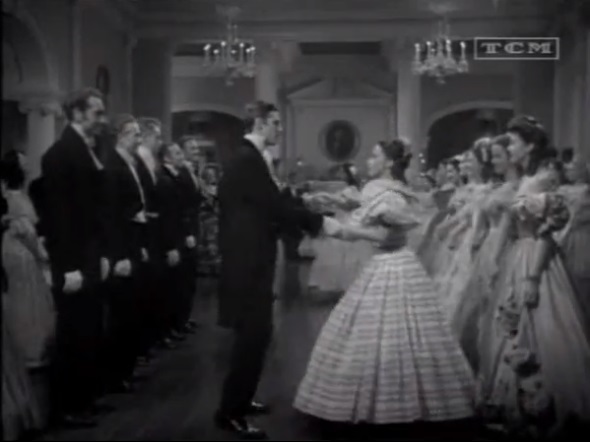
From the very start we get confirmation that no attempt whatsoever has been made to give this any historical or literary accuracy, as a wealthy lady stops to present a large package to Aunt Branwell – she is introduced as Lady Thornton, and the sisters later attend a grand ball at Thornton House.
It’s a nice touch, in a strange way, that a nod has been given to the birth village of the Brontës, Thornton near Bradford, in this way. It seems clear that the writers did have some knowledge of the Brontë story, they simply decide to mash it all up and put it back together in a totally different way: deconstructed Brontës.
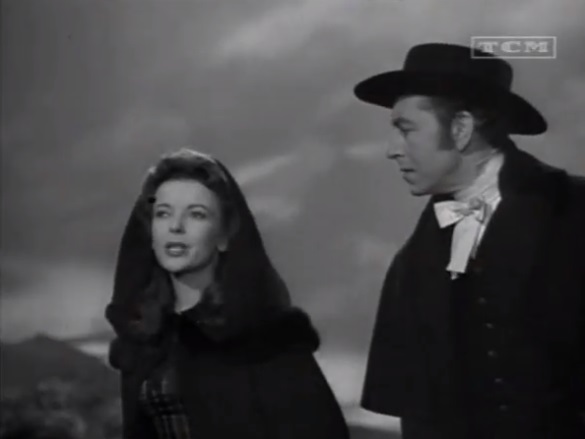
So we see a stern yet loving Patrick Brontë, Aunt Branwell takes a central role in the story which I was glad to see, and she is portrayed in a much kinder way than I might have expected. The Hegers feature (wait for it, I’m coming to that), as does publisher George Smith, and Keeper is here – although for some reason he is not a fierce mastiff but a fluffy Old English Sheepdog who could have come straight from a Dulux paint advert.
The Brontë timeline as we know it has little impact on ‘Devotion’. It is Branwell who pays to send his sisters to Brussels (after Arthur buys a painting from him with this purpose), and his illness that brings them back to England. Arthur’s arrival actually coincides with that of William Weightman in reality, and he seems to have been given much of Weightman’s charm. Aunt Branwell outlives them all, so she has to witness the death of her nephew and niece.

Another problem is that the film starts with all three sisters taking an equal footing, indeed Anne is the first sister we see – as she wrestles playfully with Branwell by the Brontë falls. But, for some reason, Anne disappears half way through only to reappear at the very end. Charlotte is portrayed as a femme fatale, with Arthur, Heger and Thackeray rapidly falling under her spell. It has to be said that all three sisters are very beautiful in this film, and some of their dresses are rather more spectacular than they may have enjoyed in real life. Coleman, as Anne, is strikingly beautiful, which won’t please a certain other Anne Brontë biographer who chose Anne’s birthday to declare, with no evidence at all and in contravention of eye witness accounts of Anne, that Charlotte had ‘prettified’ her drawings of her youngest sister. That wasn’t Charlotte’s style, but it certainly is Ellis’ style, anyway, back to the film.
Arthur first makes his move on Charlotte at the grand ball thrown by Lady Thornton. There is a dance sequence that I could watch over and over again, it’s highly comical, especially as it’s followed by a fist fight between Arthur and Branwell that could have come straight from a ‘Zorro’ movie.
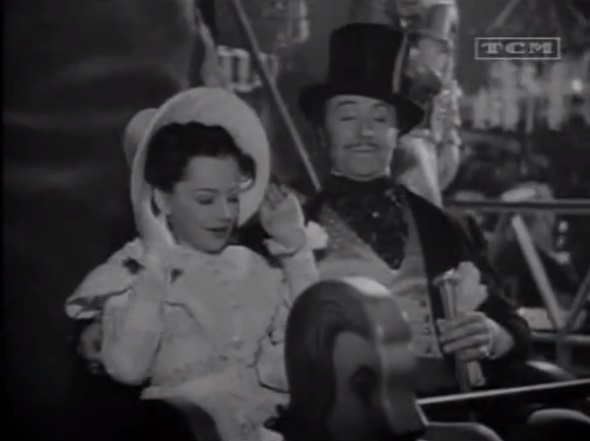
In Brussels things, historically, take a turn for the worse. Heger falls in love with Charlotte, rather than the other way round, and rather than the dashing young man that he was he is instead a portly middle aged man who is almost a caricature of a Frenchman. He takes Charlotte, or Carlotta as he insists on calling her, on a fairground ride through ‘the tunnel of mystery’. She asks him what the mystery is, after which the screen goes black until we see Charlotte rearranging her bonnet and hair as they emerge from the tunnel; ‘now there is no mystery’ says Heger.
Another caricature comes in Tabby Ayckroyd who has been to the ‘ee bah gum’ school of Yorkshire dialogue. Her first line comes when she is asked where the children are: “Oop yonder aah reckon, oop on’t moor!”
‘Jane Eyre’ becomes such a success that Charlotte travels to London not, as in real life, to prove her identity, but because she relishes fame. Thackeray quickly falls under her spell, and he takes her to the ballet. She looks down at the crowd and says she is impressed by all the people looking up at him, ‘My dear, they are looking at you!’ he replies. I thought this, and the London episode as a whole was nice, but of course in reality it was Anne that shared London with her not Thackeray, whom she only met on subsequent visits. Charlotte also finds time to have dinner with the Prime Minister and, quill in hand, she signs books for a long queue of fans that could have come straight from a Waterstones.
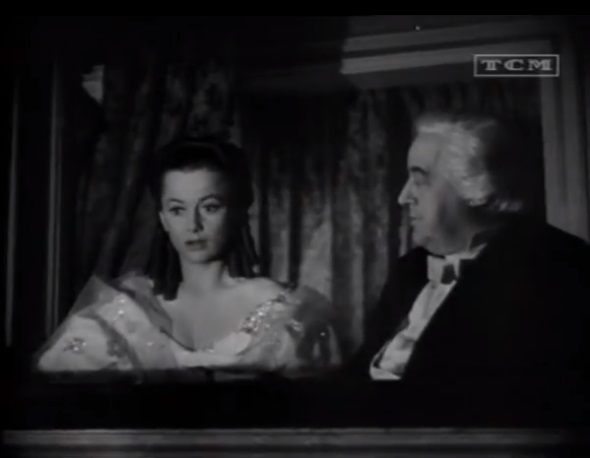
Whilst in London she drops in on Arthur, who for some unexplained reason is now living and working in the East End (if you expect lots of street urchins here, you won’t be disappointed). He finally declares his love for her, but Charlotte has to dash back to Haworth as Emily is gravely ill. The two sisters are reconciled on her death bed, and the last scene shows Charlotte on the moors once more, with Arthur by her side.
So this is all hokum, right? It’s a tragic interpretation of the Brontës that is only worth watching to laugh at, right? Well, no. By the end of the film I knew that what could have been tragic is actually something rather magic. I loved it more than any other Brontë biopic I’ve seen, despite its huge multitude of fallacies, so I will try to explain why.
Lupino and de Havilland are great actors, and they portray Emily and Charlotte brilliantly. I think Emily may well have approved of the choice of Ida Lupino to play her, because not only was she fantastic at what she did, she was a pioneer for women’s rights in the movies – in the 1950 she became the first woman to set up her own independent production company.
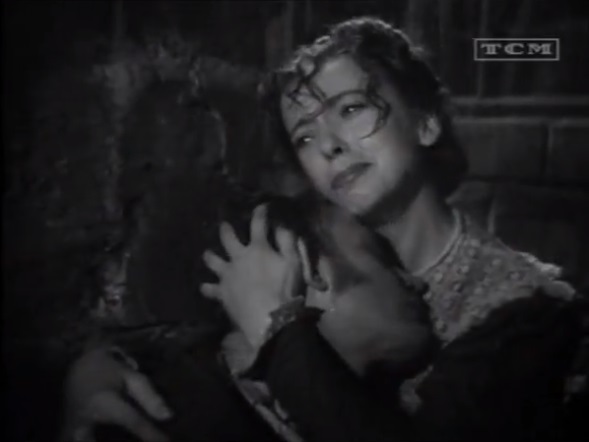
Anne, whilst not appearing nearly enough, is kind and empathic and shows a particular tenderness towards Branwell. Branwell’s frailties are shown, yes, but he is portrayed very sympathetically and we can see why his sisters love him. Branwell’s death scene is incredibly touching, and very well done. Emily dashes out in the rain looking for him and finds him collapsed in the street, where he dies cradled in her arms. It moved me to tears, it was so tenderly written and acted as Emily simply says, ‘he’s gone Charlotte.’
Arthur’s accent is ridiculous, yes, and he is an amalgam of himself and Weightman, and yet he has some good lines to deliver, and does it well. When Charlotte finally confronts him in London and asks why he paid for her and Emily to go to Brussels and later left Haworth altogether he admits, “I’m not a big enough man to live side by side with such greatness, nor am I so small that I can witness its torment.”
We see a rounded Emily; she is a brilliant genius, she loves the moors and her family, she is strong and powerful, and we also see her visionary side. Arthur asks if she really believes in ghosts, and Emily replies “Oh yes, I’ve both seen and heard them.”
Emily dies in Charlotte’s arms, but after Charlotte leaves the room a strange scene is played out. We see Emily sit bolt upright, her eyes open and then we see her ghost walking the moor until a horse comes to take her away. It could have been ridiculous, but in fact it’s very moving.
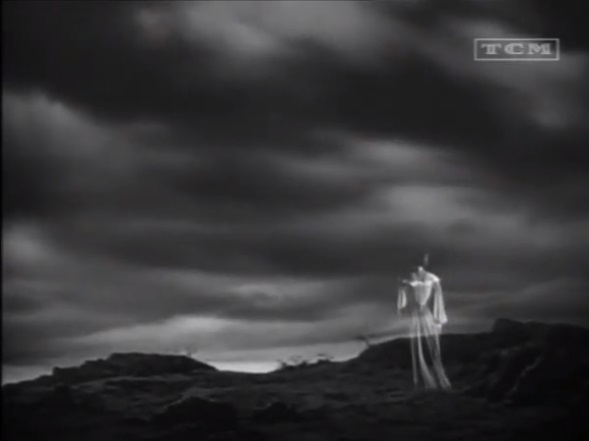
That line describes the film as a whole. I think that somebody connected with the film loved the Brontës, and somehow it shows. It lacks historical accuracy, or accuracy of any kind, it has farcical sets, squashes time to suit its purpose, and rewrites characters and events; but it does not lack heart, and it does not lack beauty and when it comes to art of any kind I always tend to agree with Keats who (quoting Theophile Gauthier) said “Beauty is truth, truth beauty, that is all ye know on earth, and all ye need to know”.
‘Devotion’ is a warm, loving tribute to the Brontë sisters and a moving portrayal of tormented genius and I commend it to you all.

This was a joy to read.
Lori
Thank you so much Lori!